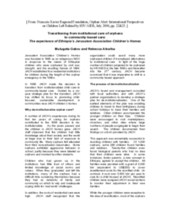Jerusalem Association Children’s Homes was founded in 1985 as an indigenous NGO in response to the needs of Ethiopian children who were orphaned by civil war, drought, and the resulting famine of 1984. JACH established four residential institutions for children during the height of the orphan emergency in the 1980s.
In 1996, JACH made the decision to transition from institutionalized child care to community-based care. Guided by a six-year strategic plan for the transition, JACH has shifted its focus to promoting child-focused, sustainable development in communities near JACH children’s homes.
A number of JACH’s experiences during its first ten years of caring for orphans contributed to the 1996 decision to de-institutionalize. As the years passed and the children in JACH homes grew, JACH staff observed that the children had little knowledge about their society and the world at large due to their lack of exposure to community life. Many orphans felt alienated from their nonorphaned classmates. Some orphans exhibited aggressive behavior in school, partly because they were labeled as orphans and mocked by other students.
Children who had grown up in the institutions had little trust of others and limited knowledge of social norms and values. When they ‘graduated’ and left the institutions, many of the orphans had a difficult time sustaining themselves because they had no networks of family and community on which to rely and inadequate coping skills for ‘real world’ challenges.
In addition, the costs of residential care were high. JACH staff recognized that the organization could assist many more orphaned children if it employed alternatives to institutional care. In light of the huge number of children projected to be orphaned by HIV/AIDS in the late 1990s and thereafter into the 21st century, JACH became convinced that it was imperative to shift to a community-based approach.
©Francois-Xavier Bagnoud Foundation

